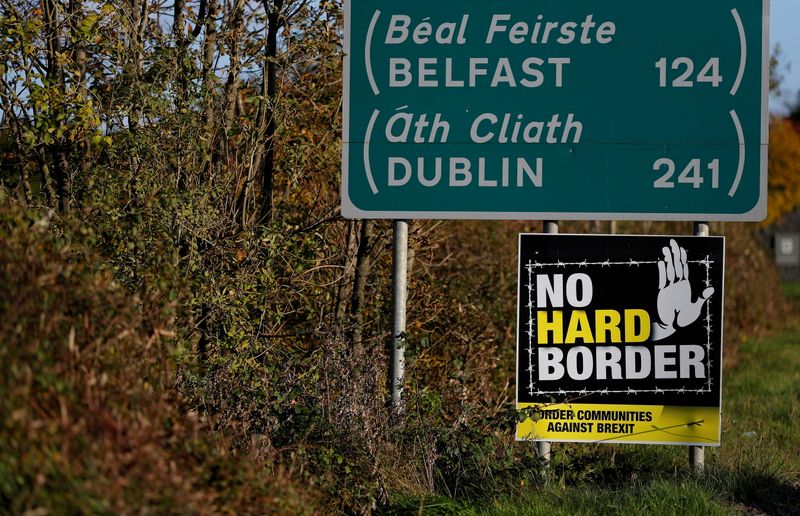(Reuters) - British Brexit minister David Frost called in a speech in Lisbon on Tuesday for the European Union to allow "significant change" to post-Brexit rules governing trade with Northern Ireland.
He was speaking a day before the EU presents its proposals to solve a standoff over part of the Brexit divorce deal.
Here is an explanation of what is at stake in talks between Britain and the EU on the so-called Northern Ireland protocol.
THE PROTOCOL – Both the EU and Britain agreed that keeping the Northern Ireland/Ireland border open was essential to preserving the 1998 peace deal that ended three decades of sectarian violence, but argued over how to do this after Brexit.
The special arrangement, set out in a protocol, left British-ruled Northern Ireland inside the EU single market for goods, meaning it follows the rules of the bloc in this area, in particular for animal products such as meat and dairy.
As a consequence, paperwork and checks are required for certain goods entering Northern Ireland from mainland Britain, to prevent it becoming a backdoor for British goods such as sausages getting into the EU without checks.
The Northern Irish Assembly can vote after four years on whether to retain the protocol. If a simple majority votes against, it would cease to apply after a further two years.
PROBLEMS – Pro-British unionists say the protocol undermines peace by dividing them from the rest of the UK with an effective border in the Irish Sea. The discontent helped fuel the worst violence in the region for years in March and April, though there has been little such turmoil since.
London points to practical problems, saying the barriers have severely hampered supplies of certain goods to Northern Ireland. The EU last month accepted British extensions to grace periods that put off some of the more onerous checks.
Britain has also complained that the protocol has led to a diversion of trade. Irish exports to Northern Ireland rose by 45% year-on-year in the first seven months of the year, with imports into Ireland up 60%, according to data from Ireland's statistics office. Comparable figures for British/Northern Irish trade have not yet been published.
EU, UK PROPOSALS - Britain demanded in July that the EU agree to rewrite the protocol to ensure that checks were only applied to goods destined for the EU and that both EU and UK regulatory rules would co-exist in Northern Ireland. It also sought to eliminate EU judges' oversight of the accord.
The European Commission will put to Britain on Wednesday a package of measures designed to ease customs controls, clearance of meat, dairy and other food products and the flow of medicines to the British province from the UK mainland. However it will stop short of the overhaul London wants.
EUROPEAN COURT OF JUSTICE - The EU has repeatedly rejected Britain's demand to end oversight of the protocol by the European Court of Justice (ECJ) and it remains a major point of contention.
The EU has said it cannot see how a body other than the EU's top court could rule on issues affecting the EU single market. The European Commission's top official dealing with the matter has said that during a visit last month to Northern Ireland, almost no one raised the ECJ as a problem.
Frost said the ECJ's role has created a deep imbalance in the way the protocol operates and that the Commission has been too quick to dismiss governance as a side issue.
ARTICLE 16 - Frost again raised the possibility of Britain triggering Article 16 of the protocol to bring about changes, though he said in Lisbon that it would "not go down this road gratuitously or with any particular pleasure."
The article allows for unilateral "safeguard" action by the EU or Britain if the protocol leads to "serious economic, societal or environmental difficulties that are liable to persist, or to diversions of trade".
Described as an emergency brake, Article 16 says any measures should be restricted in scope and duration, and limited to what is "strictly necessary" to resolve problems.
It starts a process to try and solve the particular issues. The two sides would immediately enter consultation and the safeguard measures could not come into force until one month later. Talks would continue every three months to find a remedy.
If either side believes its interests are harmed by the safeguard action, they can retaliate with "proportionate rebalancing measures". So far, neither side has formally triggered Article 16.
